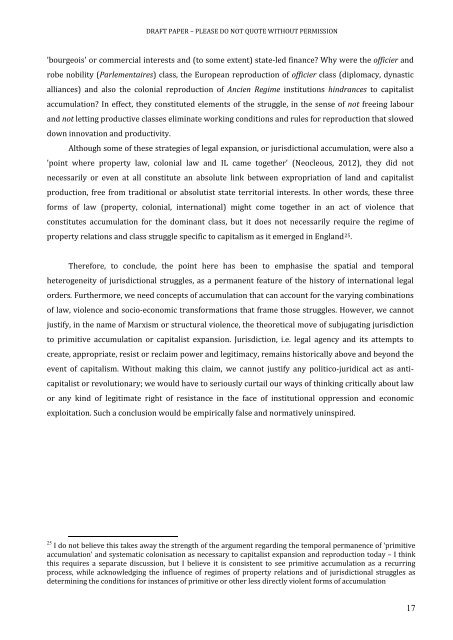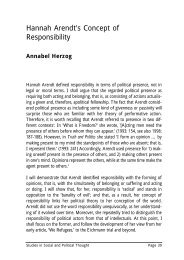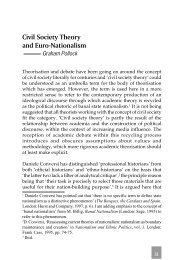Historical Materialism and International Law - University of Sussex
Historical Materialism and International Law - University of Sussex
Historical Materialism and International Law - University of Sussex
You also want an ePaper? Increase the reach of your titles
YUMPU automatically turns print PDFs into web optimized ePapers that Google loves.
DRAFT PAPER – PLEASE DO NOT QUOTE WITHOUT PERMISSION<br />
'bourgeois' or commercial interests <strong>and</strong> (to some extent) state-led finance? Why were the <strong>of</strong>ficier <strong>and</strong><br />
robe nobility (Parlementaires) class, the European reproduction <strong>of</strong> <strong>of</strong>ficier class (diplomacy, dynastic<br />
alliances) <strong>and</strong> also the colonial reproduction <strong>of</strong> Ancien Regime institutions hindrances to capitalist<br />
accumulation? In effect, they constituted elements <strong>of</strong> the struggle, in the sense <strong>of</strong> not freeing labour<br />
<strong>and</strong> not letting productive classes eliminate working conditions <strong>and</strong> rules for reproduction that slowed<br />
down innovation <strong>and</strong> productivity.<br />
Although some <strong>of</strong> these strategies <strong>of</strong> legal expansion, or jurisdictional accumulation, were also a<br />
'point where property law, colonial law <strong>and</strong> IL came together' (Neocleous, 2012), they did not<br />
necessarily or even at all constitute an absolute link between expropriation <strong>of</strong> l<strong>and</strong> <strong>and</strong> capitalist<br />
production, free from traditional or absolutist state territorial interests. In other words, these three<br />
forms <strong>of</strong> law (property, colonial, international) might come together in an act <strong>of</strong> violence that<br />
constitutes accumulation for the dominant class, but it does not necessarily require the regime <strong>of</strong><br />
property relations <strong>and</strong> class struggle specific to capitalism as it emerged in Engl<strong>and</strong> 25 .<br />
Therefore, to conclude, the point here has been to emphasise the spatial <strong>and</strong> temporal<br />
heterogeneity <strong>of</strong> jurisdictional struggles, as a permanent feature <strong>of</strong> the history <strong>of</strong> international legal<br />
orders. Furthermore, we need concepts <strong>of</strong> accumulation that can account for the varying combinations<br />
<strong>of</strong> law, violence <strong>and</strong> socio-economic transformations that frame those struggles. However, we cannot<br />
justify, in the name <strong>of</strong> Marxism or structural violence, the theoretical move <strong>of</strong> subjugating jurisdiction<br />
to primitive accumulation or capitalist expansion. Jurisdiction, i.e. legal agency <strong>and</strong> its attempts to<br />
create, appropriate, resist or reclaim power <strong>and</strong> legitimacy, remains historically above <strong>and</strong> beyond the<br />
event <strong>of</strong> capitalism. Without making this claim, we cannot justify any politico-juridical act as anticapitalist<br />
or revolutionary; we would have to seriously curtail our ways <strong>of</strong> thinking critically about law<br />
or any kind <strong>of</strong> legitimate right <strong>of</strong> resistance in the face <strong>of</strong> institutional oppression <strong>and</strong> economic<br />
exploitation. Such a conclusion would be empirically false <strong>and</strong> normatively uninspired.<br />
25 I do not believe this takes away the strength <strong>of</strong> the argument regarding the temporal permanence <strong>of</strong> ‘primitive<br />
accumulation’ <strong>and</strong> systematic colonisation as necessary to capitalist expansion <strong>and</strong> reproduction today – I think<br />
this requires a separate discussion, but I believe it is consistent to see primitive accumulation as a recurring<br />
process, while acknowledging the influence <strong>of</strong> regimes <strong>of</strong> property relations <strong>and</strong> <strong>of</strong> jurisdictional struggles as<br />
determining the conditions for instances <strong>of</strong> primitive or other less directly violent forms <strong>of</strong> accumulation<br />
17
















